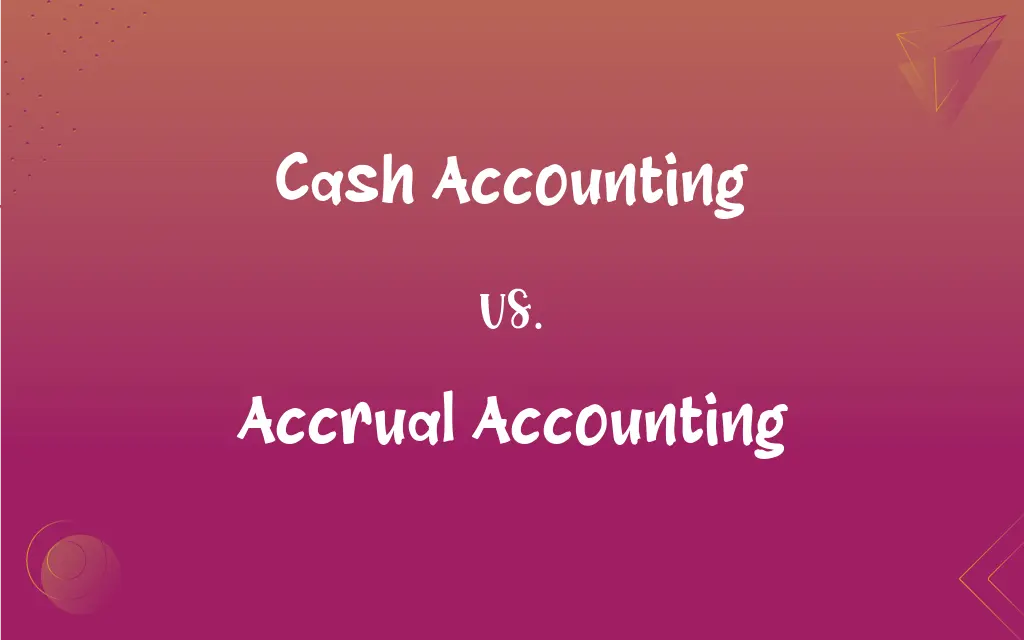Cash Accounting vs. Accrual Accounting: What's the Difference?
Edited by Aimie Carlson || By Janet White || Published on November 4, 2023
Cash Accounting recognizes revenue and expenses when cash is exchanged, while Accrual Accounting recognizes them when earned or incurred.

Key Differences
Cash Accounting and Accrual Accounting are two primary methods used for financial reporting, each offering a unique perspective on an entity's financial position. In Cash Accounting, revenue is recorded when cash is received, and expenses are recorded when cash is paid, regardless of when the service was provided or the product was delivered. This method offers simplicity and is mainly used by smaller businesses or individuals because of its straightforward approach.
On the contrary, Accrual Accounting operates on the principle that financial events should be recognized when they occur, not necessarily when cash changes hands. Thus, in Accrual Accounting, revenue is recognized when earned, and expenses are recorded when incurred, regardless of the actual cash movement. This approach provides a more comprehensive view of a company's financial health, especially for businesses with complex operations and longer transaction cycles.
For instance, if a business provides services in December but doesn't receive payment until January, Cash Accounting would recognize the revenue in January. However, Accrual Accounting would recognize the revenue in December when the service was rendered. Similarly, if a business incurs an expense in February but pays the bill in March, Cash Accounting records the expense in March, while Accrual Accounting recognizes it in February.
It's essential to recognize that while Cash Accounting can offer a clearer view of cash flow, Accrual Accounting gives a better representation of profitability and overall financial performance. Depending on the nature of operations, businesses might choose between Cash Accounting and Accrual Accounting, but many larger companies and those publicly traded usually adopt the Accrual Accounting method due to regulatory requirements.
Lastly, both Cash Accounting and Accrual Accounting have their merits and limitations. While Cash Accounting is simpler and focuses on liquidity, Accrual Accounting offers a broader, more in-depth insight into an organization's operations and its financial standing over longer periods.
ADVERTISEMENT
Comparison Chart
Revenue Recognition
When cash is received.
When revenue is earned, regardless of cash receipt.
Expense Recognition
When cash is paid.
When expense is incurred, regardless of cash payment.
Complexity
Simpler approach.
More complex, captures economic events comprehensively.
Usage
Smaller businesses or individuals.
Larger companies, especially publicly traded entities.
Financial Perspective
Focuses on cash flow.
Provides a broader view of profitability.
ADVERTISEMENT
Cash Accounting and Accrual Accounting Definitions
Cash Accounting
An accounting method where revenue and expenses are recorded upon cash receipt or payment.
With Cash Accounting, a sale made on credit is recorded only when payment is received.
Accrual Accounting
Captures all financial events, irrespective of cash movement.
Accrual Accounting records an expense as soon as the obligation arises.
Cash Accounting
Recognizes transactions based on actual cash flow.
In Cash Accounting, purchasing an item on credit won't affect the books until payment.
Accrual Accounting
An accounting method recognizing revenue when earned and expenses when incurred.
In Accrual Accounting, sales made on credit are recorded immediately as receivables.
Cash Accounting
An accounting system emphasizing cash receipts and payments.
Cash Accounting provides a clear picture of actual cash in hand.
Accrual Accounting
Standard for most larger businesses due to its depth and regulatory alignment.
Publicly traded companies often use Accrual Accounting to meet financial reporting standards.
Cash Accounting
Reports only cash transactions in financial statements.
Under Cash Accounting, unpaid bills don't appear as liabilities.
Accrual Accounting
Provides a comprehensive view of a company's financial health.
Accrual Accounting helps businesses understand profitability over extended periods.
Cash Accounting
A straightforward approach to accounting, focusing on liquidity.
Many small businesses prefer Cash Accounting for its simplicity.
Accrual Accounting
Recognizes transactions based on economic events.
Accrual Accounting captures all obligations and entitlements, including those unpaid.
FAQs
What is Cash Accounting?
Cash Accounting records revenue and expenses upon actual cash receipt or payment.
How does Accrual Accounting work?
Accrual Accounting recognizes revenue when earned and expenses when incurred, regardless of cash movement.
Is Cash Accounting suitable for large corporations?
Typically, larger corporations use Accrual Accounting due to its comprehensiveness and regulatory requirements.
Which accounting method is simpler?
Cash Accounting is generally simpler, focusing on actual cash flow.
Does Accrual Accounting recognize unpaid invoices?
Yes, it records them as accounts receivable.
How does Cash Accounting treat credit sales?
Revenue from credit sales is recorded only when payment is received.
Can a business switch from Cash Accounting to Accrual Accounting?
Yes, but it requires adjustments to financial statements.
How does Accrual Accounting impact financial statements?
It provides a broader view of profitability and financial health over extended periods.
Why do some businesses prefer Accrual Accounting?
It provides a more accurate picture of long-term financial performance.
How does Accrual Accounting handle prepaid expenses?
They are recorded as assets and expensed over the usage period.
In Cash Accounting, when are expenses recorded?
Only when they are paid.
Which accounting method offers a better long-term financial perspective?
Accrual Accounting provides a more comprehensive view of long-term financial health.
Which method gives a clearer view of cash flow?
Cash Accounting focuses primarily on actual cash in and out.
Is Cash Accounting accepted under GAAP?
Generally, GAAP favors Accrual Accounting for its comprehensive approach.
How does Accrual Accounting handle unpaid bills?
They are recorded as accounts payable.
In Cash Accounting, when is revenue considered earned?
Only when cash is actually received.
How do businesses decide between Cash Accounting and Accrual Accounting?
It often depends on business size, regulatory needs, and the desire for financial insight.
Can Accrual Accounting indicate potential cash flow problems?
Yes, if receivables are high and cash is low, it can signal issues.
Are there tax implications when choosing an accounting method?
Yes, and businesses should consult with financial experts before deciding.
Which accounting method can better manage seasonality in businesses?
Accrual Accounting can provide a clearer picture over fluctuating periods.
About Author
Written by
Janet WhiteJanet White has been an esteemed writer and blogger for Difference Wiki. Holding a Master's degree in Science and Medical Journalism from the prestigious Boston University, she has consistently demonstrated her expertise and passion for her field. When she's not immersed in her work, Janet relishes her time exercising, delving into a good book, and cherishing moments with friends and family.
Edited by
Aimie CarlsonAimie Carlson, holding a master's degree in English literature, is a fervent English language enthusiast. She lends her writing talents to Difference Wiki, a prominent website that specializes in comparisons, offering readers insightful analyses that both captivate and inform.






































































